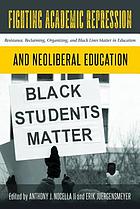
The issues that motivated students to stage sit-ins, hold rallies, and advocate for change during the 1990s carried over into the twenty-first century, although activists’ strategies began to be transformed by the use of new communication technologies. Although not exclusively student-led, the Occupy Movement, Black Lives Matter, and protest movements supporting the rights of immigrants and the LGBTQ community engaged large numbers of college students energized by the disparities wrought by growing income inequality throughout society and the enduring problems of racism, marriage inequality, and immigration reform. Policing the Campus: Academic Repression, Surveillance, and the Occupy Movement, edited by Anthony J. Nocella II and David Gabbard, offers essays written by activists who place struggles over the growing corporatization of higher education and the repression of free expression within the context of the broader Occupy Movement. Another important collected work, also by Nocella and coeditor Erik Juergensmeyer, is Fighting Academic Repression and Neoliberal Education: Resistance, Reclaiming, Organizing, and Black Lives Matter in Education. Not all of the contributors focus on student activism, but they provide a good overview of the state of radical African American activism within academe. Similarly, Randy Shaw’s second edition of The Activist’s Handbook: Winning Social Change in the 21st Century does not exclusively examine activism on campus, but the author does provide tactical guidance to student groups pressing for social change. Student Activism as a Vehicle for Change on College Campuses: Emerging Research and Opportunities, by Michael Miller and David Tolliver, uses case studies—the racially charged protests at the University of Missouri, the protest over contract negotiations at City University of New York, the fight over curriculum reform at Seattle University, and the student rallies against tuition hikes at the University of California—as lessons learned about contemporary student activism. The authors pay particular attention to protesters’ reliance on technology and campus leaders’ responses to student activism, addressing protest as a positive challenge rather than simply a problem to be solved. They succeed in placing the future of activist engagement by students entering college after the Millennial generation within the context of their life experiences.
The relatively sparse monographic literature about college student activism in the twenty-first century does not reflect any real lack of engagement, however. Beginning in the mid-1990s, there has been a resurgence in citizenship education whereby those in higher education attempt to take some degree of ownership over students’ natural desire to challenge the status quo, thus channeling their engagement prosocially while perhaps—not coincidently—gaining some control over the unpredictable dynamics of activism. One can witness educational opportunities taking the form of service learning, volunteerism, and such university-sponsored initiatives as alternative spring breaks for local community or overseas-based summer service projects. Although educating future citizens to function productively in a democratic society has always been a key mission of higher education, colleges and universities appear to be normalizing students’ desires for social change around institutionally supported forms of teachable moments and learning opportunities. The literature on service learning and citizenship education in higher education is voluminous. Some examples that reflect the intersection of civic engagement and activism include the recent work edited by Krista M. Soria and Tania D. Mitchell, Civic Engagement and Community Service at Research Universities: Engaging Undergraduates for Social Justice, Social Change and Responsible Citizenship. The book is intended to inform campus administrators about how to build and manage citizenship programs and initiatives, and contributors document the ways in which research universities can encourage student involvement in civic and community projects within an increasingly interconnected world. An important work published earlier, edited by Carolyn R. O’Grady, is Integrating Service Learning and Multicultural Education in Colleges and Universities. Its essays describe the theoretical constructs behind the incorporation of multicultural principles into service-learning programs and offer examples of community programs that schools can develop to promote social change. Susan J. Deeley’s Critical Perspectives on Service-Learning in Higher Education focuses on describing the theory and praxis of critical pedagogies, service learning, and reflective writing as ways to enhance empathy and build community. Also of note is Higher Education and Democracy: Essays on Service-Learning and Civic Engagement, edited by John Saltmarsh and Edward Zlotkowski. This work brings together twenty-two essays in which the authors examine the historical roots of the service-learning movement and demonstrate the need for action in developing curricula that support higher education’s civic mission.
With exception of Miller and Tolliver’s 2017 work, comprehensive monographic studies have yet to emerge that examine college student activism in the second decade of the twenty-first century within the context of today’s hyperpartisan political environment. The activism of students on today’s college campuses parallels in some ways the student protests of the 1960s, when students were engaged in a broad spectrum of social justice causes and made significant contributions to much larger protest movements throughout society. This is especially the case if one interprets volunteerism, community service, and service learning to be an applied form of college student activism—different, but not necessarily separate from the more recognizable, direct acts of protest that continue to occur. A directory of current student campaigns and activist groups can be found at CampusActivism.org, an open-access interactive website for progressive activists seeking information about starting a campaign, sharing resources, publicizing events, and building networks.
 Fighting academic repression and neoliberal education : resistance, reclaiming, organizing, and black lives matter in education by
Fighting academic repression and neoliberal education : resistance, reclaiming, organizing, and black lives matter in education by